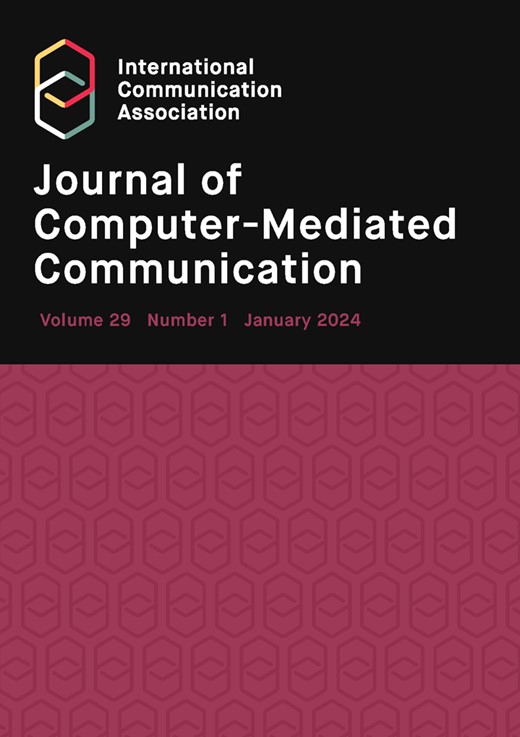断开数字连接的瞬间动机:体验取样研究
IF 5.7
1区 文学
Q1 COMMUNICATION
引用次数: 0
摘要
针对不良(过度)使用移动技术的一个备受讨论的解决方案是断开数字连接。关于个人减少使用数字媒体的原因,大部分研究都是横向评估的,没有考虑到日常情况下的各种断开连接做法。本研究关注的是在不同情况下断开连接的三个动机:(a) 避免分心,(b) 提高幸福感,(c) 更有存在感。对 230 名年轻成年人(年龄=25.31,平均年龄=4.50)进行了为期 14 天的经验取样研究,结果显示有 7360 种断开行为。多层次回归分析表明,在情境层面上,避免分心和更有存在感的动机与断开连接有关。然而,一个人的这些动机的平均水平并不能预测脱节行为。无论是在参与者之间还是在参与者内部,幸福感动机都与断开连接无关。其他分析还探讨了不同时间段和不同程度的数字断开连接之间的差异。本文章由计算机程序翻译,如有差异,请以英文原文为准。
Momentary motivations for digital disconnection: an experience sampling study
A much-discussed solution for undesirable (over-)use of mobile technologies lies in digital disconnection. Reasons for why individuals reduce their digital media use have been assessed mostly cross-sectionally without accounting for various disconnection practices across everyday situations. This study focuses on three motivations to disconnect that can vary between situations: to (a) avoid distractions, (b) improve well-being, and (c) be more present. A 14-day experience sampling study with 230 young adults (Mage = 25.31, SD = 4.50) yielded 7,360 situations of disconnective behavior. Multilevel regression analyses show that motivations to avoid distractions and to be more present were relevant for disconnection on the situational level. However, a person’s average level of these motivations did not predict disconnective behavior. The well-being motivation was not associated with disconnection either between or within participants. Additional analyses explore variations across time and different levels of digital disconnection.
求助全文
通过发布文献求助,成功后即可免费获取论文全文。
去求助
来源期刊
CiteScore
9.60
自引率
2.80%
发文量
26
期刊介绍:
The Journal of Computer-Mediated Communication (JCMC) has been a longstanding contributor to the field of computer-mediated communication research. Since its inception in 1995, it has been a pioneer in web-based, peer-reviewed scholarly publications. JCMC encourages interdisciplinary research, welcoming contributions from various disciplines, such as communication, business, education, political science, sociology, psychology, media studies, and information science. The journal's commitment to open access and high-quality standards has solidified its status as a reputable source for scholars exploring the dynamics of communication in the digital age.

 求助内容:
求助内容: 应助结果提醒方式:
应助结果提醒方式:


